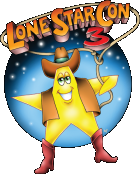There are a lot of reasons to go to a convention, as our posts this month have demonstrated pretty clearly. That said, most of those reasons fall into the broad category of furthering your writing career. Yes, you might go to San Diego Comic-Con to catch a glimpse of your favorite celebrity, but the various professional cons we’ve showcased are typically for people who are trying to make inroads, either with publishers and editors or with potential fanbases. In short, it’s all about meeting people and forging relationships that will help take your career from Point A to Point B.
But relationships don’t just happen; they have to be cultivated. You don’t just meet someone at the bar one night and then…
Okay, maybe that’s a bad example.
Except that it’s not-at least, not in the context of a professional con. We’re not talking one-night stands here. Whether it’s Worldcon or WFC, a chance encounter with an editor or agent at the bar, in the elevator, or in the booth next to you at dinner has the potential to make a big difference in your career. Exchanging pleasantries is only the first step. A compelling elevator pitch only gets your foot in the door. A business card, no matter how well designed it may be, won’t secure you a publishing contract. And yet, this is probably all you have time for while you’re at the con, because time is a commodity, and over the course of a single weekend it’s very limited. Come Monday morning, it’s wheels up and everyone goes their separate ways.
Going to the con, it turns out, was the easy part. Getting up the courage to approach that award-winning author was nothing but preamble. You made your first impression, and hopefully it was a good one. Now it’s time for something infinitely more difficult-staying in contact with the people you met.
Bear in mind that you’re not going to forge a fruitful relationship with everyone you exchanged a business card with, but some of those connections will pay big dividends. Maybe you’ll stay in touch with a group of fellow writers, forming a critique group. That happened to me. Maybe you’ll get the opportunity to send your completed novel to a purchasing editor from a major publishing house. That happened to me, too. The key is to strike while the iron’s hot-an irritating cliché, perhaps, but an instructive one. It’s okay to take a day or two to cool off, but within the week be sure to follow up with the people you met. After those initial few weeks, you may find that the opportunity has passed you by.
My main piece of advice is that you should be careful not to be an irritant. Editors, agents, and other professionals are busy people and may not respond to you the same day. In the same way that you hopefully didn’t present yourself as a desperate, needy person at the con, be professional and patient in your dealings with people afterward. Make sure that they remember you for the right reasons.
And of course there’s one other big thing that usually happens after the con: increased fervor and productivity. Take full advantage of the momentum boost and cruise through your current work in progress. There’s nothing like a weekend of schmoozing with professionals to inspire you to greatness!


